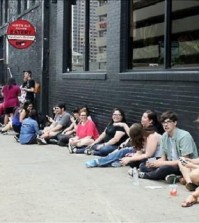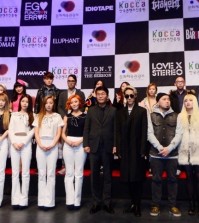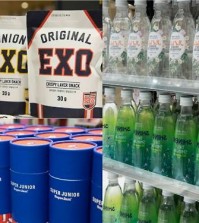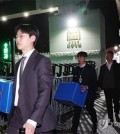- California Assembly OKs highest minimum wage in nation
- S. Korea unveils first graphic cigarette warnings
- US joins with South Korea, Japan in bid to deter North Korea
- LPGA golfer Chun In-gee finally back in action
- S. Korea won’t be top seed in final World Cup qualification round
- US men’s soccer misses 2nd straight Olympics
- US back on track in qualifying with 4-0 win over Guatemala
- High-intensity workout injuries spawn cottage industry
- CDC expands range of Zika mosquitoes into parts of Northeast
- Who knew? ‘The Walking Dead’ is helping families connect
‘Konglish’ Is Pervasive in K-pop Songs
“English lyrics are awkward and hardly fit in the context. They are just fillers.”
Finding a K-pop song with lyrics entirely in Korean is getting increasingly difficult. Behind the changes are musicians and producers who seem to regard the mixture of Korean and English as fancy, and more importantly, are trying to make K-pop more appealing to the global audience.
Yet English lyrics are not always worded properly. Many international K-pop fans say they are even frustrated by what they call “awkward” English terms or expressions in K-pop.
“They (international K-pop fans) become annoyed with strange English lyrics,” Mimsie Ladner wrote in an article she posted on the Huffington Post under the headline, “K-pop and the Future of Korea.” She went on to say they are also frustrated by “seemingly identical tunes that blare from just about every storefront of the country.” Another foreign K-pop listener echoed the view, saying, “If [K-pop musicians] are going to use English, they should use real English.” The listener, who refused to be identified, said, “It’s always random, meaningless words like ‘man,’ ‘girl,’ ‘you,’ ‘baby,’ ‘Come on,’ which only lower the quality of the songs.”
Netizen Buzz, an English-language blogger, had harsher criticism regarding the careless use of English. “The only English used in K-pop songs are on the level of elementary school grammar” was a comment found on the website. “What I hate the most are lyrics that are in Korean with only one or two words written in English. What’s the point of that? Just pick one or the other.”
Another comment said, “My English teacher burst out laughing when she heard a K-pop song, asking what kind of lyrics are they.”
Critics say the music of much-touted idol stars and teenage newcomers to the music scene are considered most vulnerable to this. “Stupid in love,” sung by Soyu and rapper Mad Clown and ranked fifth on the country’s biggest music chart Melon as of Saturday, is without English lyrics during the first two minutes. Shortly after, the rapper abruptly chants “Now we can go back” and then resumes rapping in Korean. Later in the four minute song the rapper croons, “Somebody got to say goodbye.” Considering the lyrics of the song, the two English sentences don’t fit in with the context of the music and play as “just filler words,” said a music critic.Top star IU’s new song “Pink Shoes,” ranked second on the chart, is no exception. In a typical K-pop dance tune whose introduction is mixed with Latin beats, the singer says “Summer time” and “Slow the time, stop the time” several times. Later in the song, IU also says, “Oh my pink shoes, Oh my…”
“What’s worrisome is that English lyrics in K-pop songs hardly fit in the context. They are just fillers,” said Kang Tae-kyu, a music critic. “I was told from composers or lyricists that they use English words because it’s easier than Korean to fit them into beats, which mean they don’t care about their contextual harmony.” Another critic argued that the careless use of English will remain unchanged as long as K-pop musicians try to appeal to international fans.

















![넷플릭스 2025년 라인업 공개 [넷플릭스 제공. 재판매 및 DB 금지]](http://www.koreatimesus.com/wp-content/uploads/2025/04/20250415135202671-copy-120x134.jpg)

Cassandra
October 22, 2013 at 5:26 PM
I think it’s IU Red Shoes….great example of Engrish B.A.P Hurrican…Himchan sings “The Loof the loof the loof is on fire” This was changed for their album release, and left me wondering if it was done on purpose? The clip was filmed in USA, they were touring there at the time, so I find it hard to fathom that they would not make sure the English catchphrase-which is known by all!!-wasn’t pronounced correctly! Was it done on purpose to generate more views, be it for the wrong reason? It certainly worked & got the KPop community talking!!
paulbg
December 4, 2013 at 4:30 AM
There’s a wide range of quality in the English incorporated into K-pop songs. Top acts such as 2NE1 and T-Ara generally integrate and perform their English lyrics well, and it’s a positive contribution to their songs. Of course, it helps that some of their members have lived in the States. Performers with lesser skill or with less support from their production companies often include inappropriate throwaway phrases and/or mispronounce them. A good example of this is Solbi: scandals aside, she’s a talented performer, but her 오뚜기 (“roly-poly doll”) is littered with nonsensical phrases such as “let’s party time” (“it’s party time” × “let’s party”?) and “I wanna take my hand” or mispronounced words such as “tomollow.” A few minutes of guidance from her production company could easily fix this.